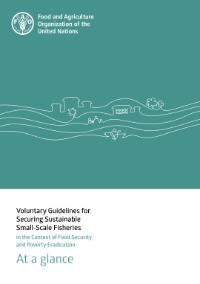Focal point
Location
The Food and Agriculture Organization of the United Nations leads international efforts to defeat hunger. Serving both developed and developing countries, FAO acts as a neutral forum where all nations meet as equals to negotiate agreements and debate policy. FAO is also a source of knowledge and information. We help developing countries and countries in transition modernize and improve agriculture, forestry and fisheries practices and ensure good nutrition for all. Since our founding in 1945, we have focused special attention on developing rural areas, home to 70 percent of the world's poor and hungry people.
Members:
Resources
Displaying 166 - 170 of 5074El derecho de aguas en algunos países africanos
Este estudio es una contribución más en la tarea de realizar un inventario mundial de experiencias nacionales en el campo de la legislación y administración de aguas. Dado su interés en fomentar la producción agrícola, que requiere un mayor uso consultivo del recurso agua, la FAO se ha ocupado siempre de los aspectos institucionales y jurídicos de la gestión del recurso agua.
VGGT: Governance of Tenure
Tenure is crucial to the livelihoods of billions of people. For many, their food security is linked to their tenure security. People with weak, insecure tenure rights risk losing their means to support themselves if they lose their access to natural resources. Women often have weaker tenure rights where there is discrimination in laws and customs. Tenure systems define who can use which natural resources, for how long and under what conditions. Many tenure problems are caused by weak governance and attempts to address them are affected by the quality of governance.
Biophysical and socio-economic baselines: The starting point for Action Against Desertification
The Action Against Desertification (AAD) project supports eight countries – Burkina Faso, Ethiopia, Fiji,
Gambia, Haiti, Niger, Nigeria and Senegal – in the Africa, Caribbean and Pacific Group of States in the
sustainable management and restoration of degraded land. Baseline assessments have been carried
out in each of these countries to establish a reference against which to monitor changes and project
impacts, as well as to better target project activities and inform other stakeholders and restoration
initiatives in the eight countries.
Climate-Smart Agriculture for Punjab, Pakistan
The climate-smart agriculture (CSA) concept reflects an ambition
to improve the integration of agriculture development and climate
responsiveness. It aims to achieve food security and broader
development goals under a changing climate and increasing food
demand. CSA initiatives sustainably increase productivity, enhance
resilience, and reduce/remove greenhouse gases (GHGs), and
require planning to address trade-offs and synergies between
these three pillars: productivity, adaptation, and mitigation [1].
Voluntary Guidelines for Securing Sustainable Small-Scale Fisheries in the Context of Food Security and Poverty Eradication. At a Glance
Small-scale fisheries play a key role in ensuring food security and eradicating poverty. However, the overall development of the fisheries sector, as well as increased pressure from other sectors (e.g. tourism, aquaculture, agriculture, energy, mining, industry, infrastructure developments) with often stronger political or economic influence, has contributed to a decline in aquatic resources and threats to aquatic habitats, ecosystems and small-scale fisheries community livelihoods.











